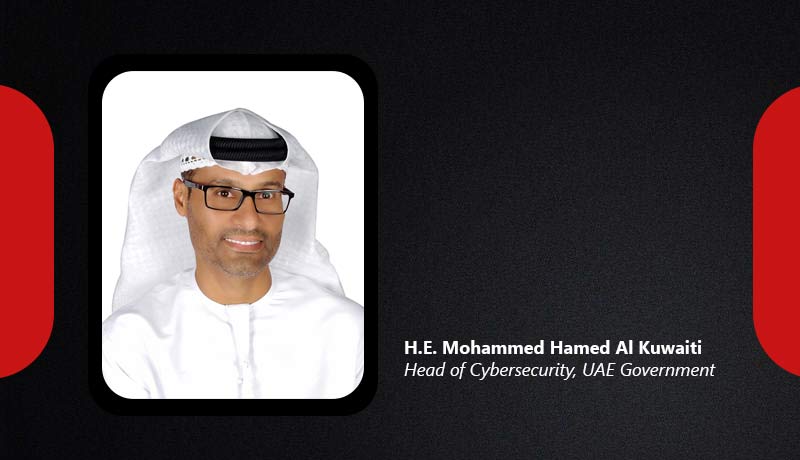
The first-of-its-kind Disinformation and Fake News event, presented by Multiverse Innovation and Ejtemaat Events, brought together worldwide experts, researchers, and professionals from the disciplines of cybersecurity, communication, defence, and other important sectors, and it began as a virtual event today.
Powered by the global pioneers in the industry which includes a panel of :– H.E. Mohammed Hamed Al Kuwaiti, Head of Cybersecurity, UAE Government; Dr. Ahmed Saif Al Ketbi, Chief Information and Security Officer, Dubai Electricity and Water Authority, UAE; Rand Waltzman, Senior Information Scientist, RAND Corporation, USA; Ken Gamble, Investigations, Intelligence & Recovery Fraud and Cybercrime Specialist, Australia; Elizabeth Linder, Founder and Chief Diplomatic Officer, Brooch Associates, UK; Selim J. Eddé, Director & Head of Government Affairs & Public Policy, Google Middle East and North Africa; Dr. Hoda Al Khzaimi, Director, Center of Cyber Security, New York University Abu Dhabi, UAE, Christina Nemr, Director, Park Advisors, USA; Lindsay Whyte, Regional Intelligence Director, Constella Intelligence, UK; Dan Brahmy, Co-founder and CEO, Cyabra; this online forum analyzed the measures to counter-strategies to combat disinformation, fake news with the aid of latest technology tools such as AI and other best practices from the fields of cybersecurity, communication and cryptology.
Over the last 18 months, the power of misinformation and fake news has been vividly shown. With whole populations compelled to stay at home and communicate largely through the digital domain, the Covid-19 epidemic hastened the world’s digital revolution in a dramatic and irreversible way.
Speaking on the importance of a national action plan for mitigating and combating disinformation, H.E. Mohammed Hamad Al Kuwaiti said “UAE is going through a digital transformation through all sectors; economic, social, healthcare and much more. There is no correct response to disinformation, the tools and techniques are constantly evolving.”
Dr. Ahmed Saif Al Ketbi also spoke as a keynote speaker on the first day of the virtual conference, discussing best practices for defending organizations against misinformation, noting that “the risk of disinformation is not confined to brand or reputation harm.”
While the event featured local industry leaders, it also featured a diverse lineup of global thought leaders, including Rand Waltzman, who spoke about how artificial intelligence adds a new dimension to the fight against disinformation threats, stating, “In the age of automated influence, AI has the ability to produce hyperreal digital falsification.”
Elizabeth Linder spoke on the first day of the event’s inaugural edition about the true impact of disinformation on business and government organizations, as well as on our daily lives, saying, “In today’s world, there is no such thing as fixed time and space; there is unlimited time and space to share information you believe people should know.” As an organization, don’t be afraid to do so.”
Without a doubt, the virtual conference’s first day’s success can be attributed to its stellar speaker lineup, which included Lyric Jain, who participated in an engaging panel discussion about the role and responsibilities of digital platforms in keeping online users safe, as well as the best actions to counter illegal content activity. “The approach that we take is kind of giving the capability to counter misinformation operations where we can bring in automation to identify the strategies, techniques, and processes that various disinformation agents employ to execute these campaigns,” Lyric said during the conversation.
4.5 billion individuals use social media on a daily basis nowadays. More over half of the world’s population lives in this region. The average daily usage time is expected to be around two and a half hours. Nearly all of those 4.5 billion people use their cellphones to browse social media, giving them instant access to any type of information. Facebook, the world’s most popular social networking platform, with almost 2 billion daily active users. Of course, Facebook isn’t alone; another billion or so people use WhatsApp, YouTube, Instagram, and WeChat, among other services.
Hassan Al Noon Managing Director, Multiverse Innovations UAE from the organizers said, “With so many people spending so much of their time online, consumption of digital news and information has significantly increased, and the spread of disinformation has proliferated. We continue to feel the effects of COVID-19 anti-vaccination disinformation today, and fake news will continue to affect society in significant ways for many years to come. Sophisticated scam artists and other nefarious actors are often involved in creating disinformation to create uncertainty and distraction which can adversely affect defense and security infrastructure, banking, commerce, and other institutions.”
“Why now?” questioned Biju Saith, Director of Ejtemaat Events. Technology advancements and the fast growth of Artificial Intelligence have accelerated the spread of misinformation, particularly among state-funded actors. As sophisticated technology becomes more widely available, we should expect this trend in the spread of misinformation to continue.
Panel discussions and workshops were held over the course of two days. The UAE Cybersecurity Council and Dubai Electricity and Water Authority supported the Global Disinfo Summit, which is sponsored by Cyabra, Constance Intelligence, and Logically. Ejtemaat Events hosted this event in collaboration with Multiverse Innovations.
